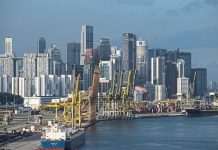With the year end fast approaching, one of the world’s longest Christmas celebrations are expected to kick-off soon in the Philippines. At the forefront of the holiday rush are the massive shopping malls the country is known for; vast emporiums that are carefully decorated to appeal to the holiday masses as early as September.
Unfortunately, the Covid-19 pandemic has not been kind to these retail behemoths, with bels and candy canes being replaced by thermal scanners and bottles of hand sanitisers.
“Even with discounts, it’s difficult to sell these days because people are afraid to go out,” said a staff member who was singlehandedly manning a dimly lit US outdoor apparel outlet in a Manila mall.
As microcosms of the Philippines’ US$377 billion consumer-driven economy, malls bore the brunt of the pandemic-induced lockdowns, the collapse in consumer confidence and the country’s first recession in three decades.
Even if the pandemic subsides, the shopping mall business may not be the same ever again. Retailers are looking at ways to cut reliance on brick & mortar stores in order to capture the attention of consumers who are falling in love with online shopping. Shopping malls are being forced to reinvent themselves in order to survive.
Developers — some of whom are already laying the groundwork for a shift to e-commerce — acknowledge the uncertainties they face.
“We believe that due to the unexpected extent of this global pandemic, after the dust settles, the behaviour of consumers would surely no longer be the same,” Injap Sia, chief executive of Double Dragon Properties, founder of newly listed retailer Merry Mart Consumer, told Nikkei Asia in a short statement.
“I think we can all just make plain predictions as nobody really knows exactly what it will be, but for sure this situation will result in having winners and losers in terms of relevance to the consumers,” Sia added.
In the tropical Philippines, shopping malls are analogous with public parks and are a way of life for the locals. In addition to restaurants, retail shops and cinemas, they host banks, remittance centres, clinics, chapels and government service centres. In 2016, authorities even considered allowing them to serve as voting precincts for the presidential election.
The Philippines has one of the highest rates of Covid-19 infections in the region despite enforcing one of the world’s longest and strictest lockdowns. Fear of catching the virus and stay-home orders have fueled a surge in online shopping.
With vacancies on the rise due to the ongoing Covid-19 pandemic and a distinct drop in customers, shopping malls are already rethinking business models with an eye on e-commerce.
“We are looking into transforming some spaces within the malls into fulfilment centres for e-commerce, and possibly repurposing some for office use,” said Arlene Magtibay, senior vice president at Robinsons Land, the second-largest mall developer.
“Malls will have to be increasingly present in the digital arena, not just for marketing purposes but, more importantly, in driving sales and traffic,” Magtibay added.
























